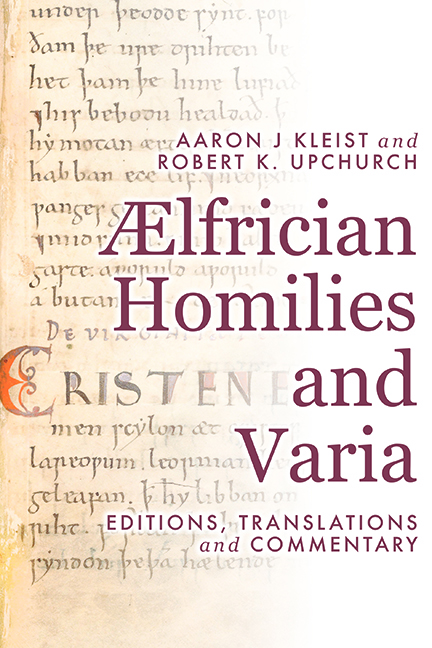Book contents
- Frontmatter
- Contents
- Preface
- Acknowledgements
- Abbreviations
- Sigla for Cited Ælfrician Manuscripts
- Dates for Cited Ælfrician Works
- Editorial Conventions
- Conventions Used in the Commentaries
- Homilies The Proper of the Season
- Homilies The Proper of the Saints
- Ælfrician Homilies and Varia: Editions, Translations, and Commentary: Volume II
- Homilies The Common of the Saints
- Homilies Unspecified Occasions
- Varia
- Works Cited
- Index
- ANGLO-SAXON TEXTS
14 - De creatore et creatura (‘Concerning the Creator and Creation’)
Published online by Cambridge University Press: 05 March 2024
- Frontmatter
- Contents
- Preface
- Acknowledgements
- Abbreviations
- Sigla for Cited Ælfrician Manuscripts
- Dates for Cited Ælfrician Works
- Editorial Conventions
- Conventions Used in the Commentaries
- Homilies The Proper of the Season
- Homilies The Proper of the Saints
- Ælfrician Homilies and Varia: Editions, Translations, and Commentary: Volume II
- Homilies The Common of the Saints
- Homilies Unspecified Occasions
- Varia
- Works Cited
- Index
- ANGLO-SAXON TEXTS
Summary
Though now damaged and incomplete, De creatore et creatura (‘Concerning the Creator and Creation’) and its companion piece De sex etatibus huius seculi (‘Concerning the Six Ages of the World’ [AH II.15]), once contained Ælfric's comprehensive outline of Christian history. De creatore appears to have combined a doctrinal exposition of the Trinity with an account of God's creation and fall of the angels, and the creation, fall, and redemption of mankind to argue for the existence of a triune God who, when he created the world in time, planned to redeem it for eternity. De sex etatibus picks up at the Fall and provides an overview of salvation history from Noah's day to the dawn of Eternity, so the two sermons present ‘the Christian “world picture” of Creation, Fall, Redemption, and Judgment in its essential simplicity’. As late works composed ca 1006, they also testify to the commitment Ælfric maintained in the last decade of his life to the ‘staged programme of teaching … designed to tell the basic Christian story sequentially from the beginning’ that he had initiated with the completion of the Catholic Homilies between 989 and 992.
Because the doctrinal discussion and episodes from salvation history that survive in De creatore are central to Ælfric's program of religious education for all Christians, it is not surprising to find that he took up this combination of ideas throughout his career. They feature in De Initio Creaturae (‘On the Origin of the Created World’ [CH I.1]), the first homily of the Catholic Homilies (989); in the Hexameron, a homily that focuses on the six days of creation (ca 993–8); in two letters to the laymen Wulfgeat and Sigeweard (ca 1005–06), and yet again in De creatore (ca 1006). Among these works, De creatore bears most resemblance to the Hexameron because Ælfric draws on the homily as one of his two main sources. De creatore is singular, however, for the way in which it marshals arguments about the Trinity, Creation, Fall, and Atonement to counter a worldview that in the extreme denies the existence of God and in the main ignores the need for salvation.
- Type
- Chapter
- Information
- Ælfrician Homilies and VariaEditions, Translations, and Commentary, pp. 707 - 752Publisher: Boydell & BrewerPrint publication year: 2022

